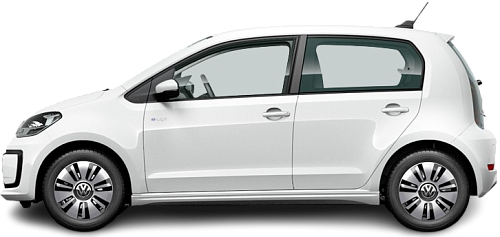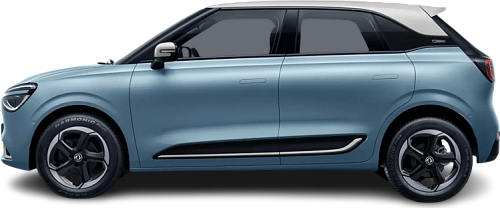Global EV Comparison: Volkswagen e-Up! 36.8 kWh vs Dongfeng Box 42.3 kWh
Struggling to Decide? Let AI Help!
Your AI Summary Is Ready!
General Info
The Dongfeng Box 42.3 kWh (2024-...) is currently produced, it has a starting price of €23400. The Volkswagen e-Up! 36.8 kWh (2020-2023) has been discontinued. You can find it for as low as €10999 on the used car market.
The two vehicles share the same body style: Hatchback.
| Property | Volkswagen e-Up! 36.8 kWh | Dongfeng Box 42.3 kWh |
|---|---|---|
| Years of Production | 2020-2023 | 2024-… |
| Current Status | Discontinued | Produced |
| Country of Manufacture | Slovakia | China |
| Body Style | Hatchback | Hatchback |
| Market Availability | EU | EU |
| Price Europe (New) | - Price Europe (New) | €23400 |
| Price Europe (Used) | €10999 | - Price Europe (Used) |
| GCC Score | 4.5 | 4.6 |
Range and Efficiency
While the Dongfeng Box 42.3 kWh (2024-...) offers a longer real-world range and a bigger battery, it is less energy-efficient than the Volkswagen e-Up! 36.8 kWh (2020-2023).
| Property | Volkswagen e-Up! 36.8 kWh | Dongfeng Box 42.3 kWh |
|---|---|---|
| Range (WLTP) | 260 km | 310 km |
| Range (GCC) | 224 km | 264 km |
| Battery Capacity (Nominal) | 36.8 kWh | 42.3 kWh |
| Battery Capacity (Usable) | 32.3 kWh | 40 kWh |
| Efficiency per 100 km | 14.4 kWh/100 km | 15.2 kWh/100 km |
| Efficiency per kWh | 6.93 km/kWh | 6.6 km/kWh |
| Range and Efficiency Score | 6.1 | 6.1 |
Charging
Both vehicles utilize a standard 400-volt architecture.
The Dongfeng Box 42.3 kWh (2024-...) offers faster charging speeds at DC stations, reaching up to 88 kW, while the Volkswagen e-Up! 36.8 kWh (2020-2023) maxes out at 40 kW.
The Volkswagen e-Up! 36.8 kWh (2020-2023) features a more powerful on-board charger, supporting a maximum AC charging power of 7.2 kW, whereas the Dongfeng Box 42.3 kWh (2024-...) is limited to 6.6 kW.
| Property | Volkswagen e-Up! 36.8 kWh | Dongfeng Box 42.3 kWh |
|---|---|---|
| Max Charging Power (AC) | 7.2 kW | 6.6 kW |
| Max Charging Power (DC) | 40 kW | 88 kW |
| Architecture | 400 V | 400 V |
| Charge Port | CCS Type 2 | CCS Type 2 |
| Charging Score | 3.9 | 3.7 |
Performance
Both vehicles are front-wheel drive.
Although the Dongfeng Box 42.3 kWh (2024-...) has more power, the Volkswagen e-Up! 36.8 kWh (2020-2023) achieves a faster 0-100 km/h time.
| Property | Volkswagen e-Up! 36.8 kWh | Dongfeng Box 42.3 kWh |
|---|---|---|
| Drive Type | FWD | FWD |
| Motor Type | PMSM | PMSM |
| Motor Power (kW) | 61 kW | 70 kW |
| Motor Power (hp) | 82 hp | 94 hp |
| Motor Torque | 210 Nm | 160 Nm |
| 0-100 km/h | 11.9 s | 12.5 s |
| Top Speed | 130 km/h | 140 km/h |
| Performance Score | 1.8 | 1.8 |
Dimensions
The Dongfeng Box 42.3 kWh (2024-...) boasts a more extended wheelbase.
| Property | Volkswagen e-Up! 36.8 kWh | Dongfeng Box 42.3 kWh |
|---|---|---|
| Length | 3600 mm | 4020 mm |
| Width (with Mirrors) | 1910 mm | 1810 mm |
| Width (w/o Mirrors) | 1645 mm | - Width (w/o Mirrors) |
| Height | 1492 mm | 1570 mm |
| Wheelbase | 2417 mm | 2663 mm |
Cargo and Towing
The Dongfeng Box 42.3 kWh (2024-...) provides more cargo capacity, featuring both a larger trunk and more space with the rear seats folded.
Neither car is equipped with a frunk (front trunk).
Neither vehicle is officially rated for towing in in the EU.
| Property | Volkswagen e-Up! 36.8 kWh | Dongfeng Box 42.3 kWh |
|---|---|---|
| Number of Seats | 4 | 5 |
| Curb Weight | 1235 kg | 1430 kg |
| Cargo Volume (Trunk) | 250 l | 326 l |
| Cargo Volume (Max) | 923 l | 945 l |
| Cargo Volume (Frunk) | - Cargo Volume (Frunk) | - Cargo Volume (Frunk) |
| Towing Capacity | - Towing Capacity | - Towing Capacity |
| Cargo and Towing Score | 3.6 | 4.2 |




